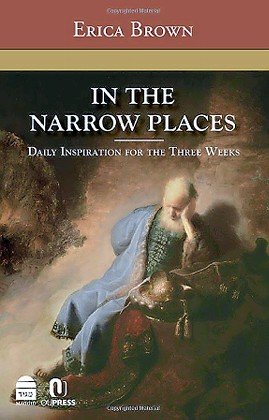Considering a broad view of narrow places
As we approach the Three Weeks, it is time to consider literature that will help us to better understand the themes that make this season the most somber on the Jewish calendar.
“In The Narrow Places” is a small 125-page collection of meditations written by writer and educator Dr. Erica Brown. This book represents to the reader a short essay for each of the 21 days of the Three-Weeks.
According to Brown, it’s aim is to help us better understand what we lost as a nation, thus justifying the mournful tone of this annual observance. This is especially needed given the distance in both time and on the ground realities that have made for us Jews today experienced in the contradiction of mourning for a Jerusalem that we see today in full bloom while the Temple Mount still stand in ruins.
Most of the essays are themed to Biblical texts that are found in our sacred liturgy on the Sabbaths and fast days of this time of year. Halachic citations and discussions are not given much play in a book that is intended for inspiration, solace, and comfort.
In reading through this work one will note the skilled use of verses from Eicha, the Book of Lamentations, as well as various verses from the liturgy of Tisha B’Av itself, all woven together to bring to you a practical application of what this season meant to both our ancestors and to ourselves.
Much use is also made of aggadita, rabbinic parables and lore. The prophets are represented prominently by the works of Jeremiah and Isaiah whose works are the centerpiece of haftorah readings at this time of year.
Just about all of the essays dwell on the deep relationship between G-d and the Jewish people, and the impact that relationship sustained through the destruction of both Temples and the abrogation of Jewish political sovereignty.
Each essay is followed by a specific mediation themed to that day’s reading, giving each day’s words a balance of mood and spirit building up to the next day.
The book’s introduction, “When Memory Speaks,” prepares the reader for a mature and well thought out presentation of what the Three Weeks has represented to our people through two millennium. The mood and setting are sober; lacking is an almost fairy tale style common in many other works. There are no collective guilt trips laced with bogus legends to be presented here as historical fact. Truly, this book’s mature presentment is meant to teach and inspire rather than to scare and admonish.
Dr. Brown concludes her opening essay with the following observation:
“Many Jews today, even committed, observant Jews, do not engage in ‘G-d talk.’ Perhaps these essays will help us along in these conversations.”
A version of this column was published in 2011.

 48.0°,
Light Rain
48.0°,
Light Rain 







